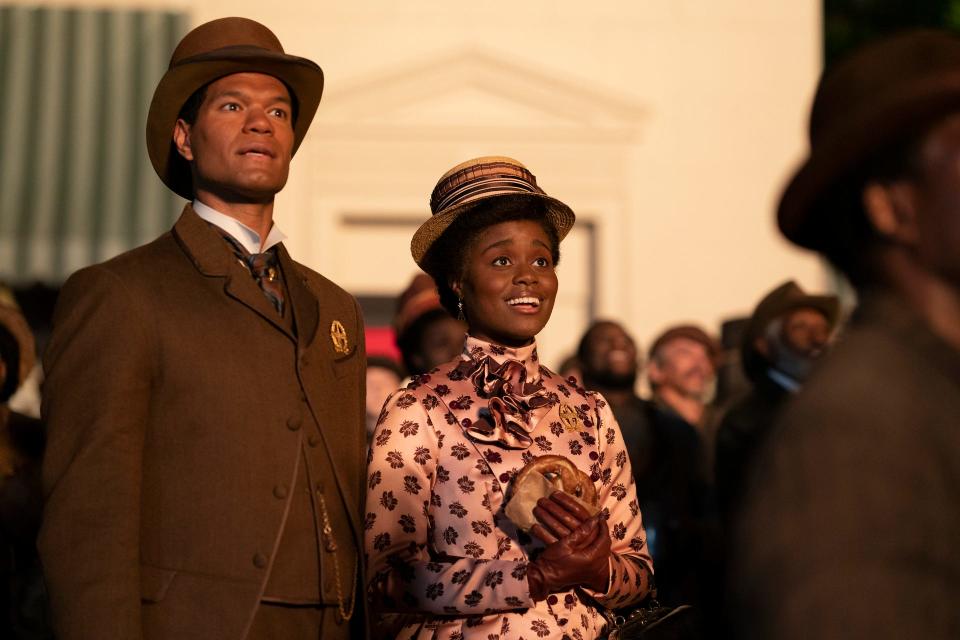The life and career of Julia C. Collins, one of the real-life inspirations behind Peggy Scott of 'The Gilded Age'

Julia C. Collins is widely credited with writing the first novel by an African American woman.
Collins is one of the influences behind the fictional character Peggy Scott in "The Gilded Age."
Collins' novel grappled with themes of racial identity and interracial marriage.
In the HBO period drama "The Gilded Age," viewers get a glimpse into the previously-overlooked world of wealthy Black Americans in the late-19th century.
The show partly follows Peggy Scott, an aspiring writer from a wealthy and educated family, as she seeks a fresh start in New York City. Her father was born into slavery but is now a successful pharmacist, and her mother a pianist.
After the Emancipation Proclamation was signed in 1863, the Gilded Age ushered in a new era of business, education, and real estate ownership for many Black Americans. Scott was inspired by several trailblazing Black women from the era, including journalist Ida B. Wells and Susan McKinney Steward, the first Black female doctor in New York.
Julian Fellowes, the show's creator, "was intentional about drawing from multiple women's lives in order to create a fictional character who embodies the spirit of the 1880s for young Black woman in the elite," Erica Armstrong Dunbar, a history professor and consultant for the show, told the Los Angeles Times.
Another influence for Scott's character was Julia C. Collins, whose 1865 novel, "The Curse of Caste; or The Slave Bride," is widely cited as the first novel written by an African American woman.

A teacher dedicated to empowering African Americans
Not much is known about Collins' early life, but scholars believe she was born a free woman in the North in around 1842.
Collins became a school teacher for African American children in Williamsport, Pennsylvania, according to an April 16, 1864, issue of the Christian Recorder, a national newspaper of the African Methodist Episcopal Church. Williamsport was an active station on the Underground Railroad.
In addition to teaching, Collins wrote essays about racial uplift and empowerment in the Christian Recorder, including essays titled "Mental Improvement," "School Teaching," and "Intelligent Women." Collins referenced the likes of Shakespeare, Alexander Pope, and Alfred, Lord Tennyson, leading some scholars to believe she was well-educated.
"We are born with faculties and power, capable of almost anything," Collins wrote in the Christian Recorder. "Who can measure our capacity, or set bounds to our progression in knowledge?"
Collins married Stephen Carlisle Collins, who ran a barber shop and served as a commander of the Grand Army of the Republic, a veteran's organization for Civil War soldiers. Barbers and schoolteachers were considered higher-status occupations for Black Americans in the 19th century.
'The Curse of Caste'
Collins published "The Curse of Caste; or The Slave Bride" in serial form over eight months in 1865 in the Christian Recorder. The novel grappled with themes of racial identity, interracial marriage, and the injustices of slavery and racism.
In the story, Lina, a mixed-race slave, falls in love with Richard, the son of a New Orleans slave owner. Although Richard discovers the truth of her identity, the couple marry. Enraged, his father disinherits him.
The newlyweds flee north to Connecticut, but Lina dies in childbirth soon after. Richard, who believes his baby daughter died as well, returns to New Orleans to make peace with his father. Meanwhile, an orphan child Claire grows up not knowing who her parents were — or her own race.
The story abruptly ends just as the plot reaches the climax and resolution — with a chance discovery and reunion just on the horizon — as Collins died suddenly of tuberculosis in November 1865.
A legacy continued
Collins never finished her novel, but scholars of African American history have sought to continue her legacy.
In 2006, the Oxford University press published Collins' novel with two alternative endings, written by editors and scholars Mitch Kachun and William Andrews.
"The fact is," Kachun said at a presentation about Collins at Saginaw Valley State University, "she is exploring what could be a happy ending, an empowering ending, in which marriage and civility are things that African American women can aspire to."
Read the original article on Insider


